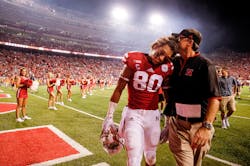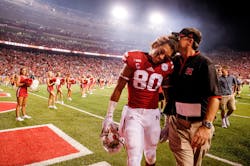How Getting a Coach Can Change Your Life
Coaches, like so much else, are wasted on the young. Learning a skill requires hours of repetition, endless drills; few things are more boring to a child, especially a child of our fidgety, distracted Digital Age. No, coaches are for grown-ups, the older the better. Here’s my advice: When your kids enter high school or college, and those weekend afternoons begin to yawn, get a coach. Bring someone into your life who, for starters, can reawaken in you the excitement of starting. You want an expert, a pro, to get you out of your stale, timeworn neural patterns and create fresh pathways in your brain not called upon by meetings and desktop monitors. That’s what learning an activity does, and studies have shown it can help fend off memory loss and worse. You want a coach to get you to embody life, before that body of yours gets the best of you.
LINCOLN, NE - SEPTEMPER 20: Wide receiver Kenny Bell #80 of the Nebraska Cornhuskers receives congratulations from position coach Rich Fisher after their game against the Miami Hurricanes at Memorial Stadium on September 20, 2014 in Lincoln, Nebraska. Nebraska defeated Miami 41-31. (Photo by Eric Francis/Getty Images)
It could be golf, or swimming, or rock climbing. But it has to start with a one-on-one relationship, an admired guide, and soon enough, hopefully, a trusted guru. The relationship between you and a coach is as important as your learning. And it’s a humbling thing later in life—at or around the top of your career arc—to have someone you look to for aid and approval, someone who will always be better than you at what you are trying to get better at. Having a coach doesn’t come cheap, but it won’t feel, in those hours of disciplined instruction, like a narcissistic indulgence.
My coach’s name is Kirill Azovtsev. I was 55 when I began training with him; he was 20, still in college, and just a few years older than my oldest son. He, Kirill, was also one of the nation’s best Division II tennis players and already a certified teaching pro. I had been watching and enjoying tennis since I was a teen but had never played. Nobody I knew played. I’d grown up in a blue-collar, Italian American community, where clubs were places older men played cards and drank espresso out of tiny cups.
He’s taught me, admonished me, applauded me, consoled me.
But with my sons in high school and those weekends no longer shaped by Little League and the like, I decided I’d give tennis a try. More than a try, in truth—I wanted to get good, as good as I could. I wanted the exercise, sure, but it was also crucial to me that I get pushed to the very limits of what I was capable of. I was eager, under careful tutelage, to improve at something. When had I last done that?
It took a while to find the right coach, someone who’d take seriously a slight and not especially athletic guy in late middle age. Kirill did—immediately, the first time we hit together in a lesson. He told me frankly that tennis wouldn’t come easy at my age, that I would have to learn grips and strokes that would feel awkward and require hundreds of hours to master. I’d have to relearn the most basic things like running; the long strides that had served me (sort of) in track and basketball as a youth were useless in getting in position to hit a tennis ball. “Short steps! Short steps!” Kirill yelled at me the first time I took a lesson with him. He still tells me that. He still yells.
We’ve been at it now for hundreds and hundreds of hours, on parched summer afternoons and indoors on barely light midwinter mornings. He’s taught me, admonished me, applauded me, consoled me. He’s gotten me in the best shape I’ve ever been in and, in my playing, made me more patient, more grateful, more forgiving of others (i.e., doubles partners) and myself. I don’t think I’m kidding myself when I say his lessons have carried beyond the court. I’m a more patient person in all aspects of my life—with my wife, my aging dad—and a more grateful person, too. Grateful, for starters, that I have the health and increasing skill to play tennis three or four times a week.
My game has gotten good enough to get me to 60-and-over national senior tournaments, where Kirill has come along a couple of times, warmed me up, and lent advice and encouragement. I have never won, let it be said. But I am still striving, still improving. I’m still being coached, too. It’s a delight and a comfort to wake each day stiff with age but knowing you are somebody’s work in progress.
Marzorati, a former editor of the New York Times Magazine, is the author of "Late to the Ball," from which this essay is adapted.


